
==> Want To Travel On A Private Jet? Check Current Rates Here! <==
If one has ever aspired to a distinguished career in aviation, pursuing a position as a private jet flight attendant may prove to be an ideal choice.
This role encompasses more than the standard responsibilities of a flight attendant; it integrates safety, luxury service, and personalized attention to detail.
This discussion will examine the responsibilities of a private jet flight attendant, the qualifications required to enter this exclusive profession, and strategies for securing this sought-after position.
Whether one is seeking a career transition or is simply intrigued by this captivating path, this exploration will provide insight into what it takes to excel in the aviation industry.
What Is a Private Jet Flight Attendant?
A private jet flight attendant is a highly trained professional tasked with ensuring a safe, comfortable, and luxurious travel experience for passengers aboard private aircraft. Their responsibilities extend beyond standard in-flight services to include personalized attention, strict adherence to safety protocols, and exceptional customer service tailored to the unique lifestyle of private aviation clients.
These skilled professionals often represent the luxury travel experience, merging aviation expertise with an understanding of client relations to cultivate a bespoke atmosphere on every flight.
What Are the Responsibilities of a Private Jet Flight Attendant?
The responsibilities of a private jet flight attendant are multifaceted and encompass several critical aspects of flight operations that contribute to a seamless and enjoyable journey for passengers. These professionals are responsible for maintaining safety protocols, delivering exceptional customer service, and overseeing in-flight services, which include catering and personal assistance, while also cultivating an atmosphere of luxury and comfort.
The role requires a high degree of adaptability and problem-solving skills to effectively address any situations that may arise during the flight.
1. Safety and Security
Safety and security represent paramount responsibilities for private jet flight attendants, necessitating a comprehensive understanding of safety protocols and FAA regulations to ensure the well-being of all passengers on board. Flight attendants must be proficient in emergency procedures and capable of executing thorough flight documentation, which includes conducting safety briefings and adhering to aviation standards. This vigilance is essential for providing clients with peace of mind during their luxury travel experience.
Plus these foundational elements, flight attendants participate in rigorous emergency drills that simulate various scenarios they may encounter, ranging from sudden turbulence to medical emergencies. Their first aid training equips them to respond effectively to health-related incidents, ensuring that they are prepared to provide immediate care when necessary. Compliance with FAA regulations is not merely a formality; it plays a critical role in upholding high safety standards and promoting a culture of exceptional crew resource management.
By actively engaging in these practices, flight attendants make significant contributions to a safe and enjoyable journey, thereby reinforcing the trust that passengers place in private air travel.
2. Customer Service
Outstanding customer service is fundamental to the role of a flight attendant, as they are responsible for ensuring an exceptional travel experience for clients aboard private jets. This responsibility involves understanding and anticipating passengers’ needs, utilizing exceptional communication skills, and adhering to the luxury service standards that characterize the private aviation industry. Their capacity to build strong client relationships, combined with adaptability in dynamic environments, is crucial in enhancing the overall travel experience.
In this exclusive sector, flight attendants must effectively manage client expectations by providing personalized services and promptly adjusting to any last-minute changes. This requires a refined sense of emotional intelligence, allowing them to assess passenger moods and respond appropriately.
When receiving feedback, whether positive or constructive, their ability to maintain professionalism and openness fosters continuous improvement and reinforces client loyalty. By consistently demonstrating a commitment to service excellence, they cultivate an atmosphere of trust, transforming ordinary flights into memorable journeys.
3. Catering and Hospitality
Catering and hospitality are essential components of a private jet flight attendant’s responsibilities, significantly influencing the luxury travel experience for passengers. Flight attendants work in collaboration with catering services to curate customized in-flight menus, ensuring that every detail, from dietary preferences to presentation, meets the high standards expected in private aviation.
Their training encompasses not only culinary knowledge but also the logistics of serving exquisite meals within the constraints of a confined space.
This distinctive combination of hospitality and aviation necessitates an understanding of various dietary restrictions, ranging from gluten-free options to vegan meals, thereby ensuring that all passengers’ needs are adequately addressed. Attention to detail is paramount; even the most minor elements, such as the selection of tableware and the arrangement of food, contribute to an unforgettable journey.
Service techniques are specifically tailored to the dynamics of air travel, such as maintaining a calm atmosphere during turbulence, thereby enhancing the overall experience. Consequently, every aspect, from dish selection to the finesse of service, plays a pivotal role in transforming a flight into a luxurious escape.
4. Housekeeping and Maintenance
Housekeeping and maintenance responsibilities are crucial for flight attendants, ensuring that the private jet remains in immaculate condition throughout the duration of the flight. This encompasses regular inspections, adherence to cleaning protocols, and compliance with appearance standards that reflect the luxurious nature of private aviation.
Attention to detail is of utmost importance, as even the slightest oversight can significantly affect the overall passenger experience.
Flight attendants diligently arrange the cabin, from vacuuming carpets to polishing surfaces, while ensuring that high-end amenities are fully stocked and maintained in optimal condition. They verify that luxury toiletries are available in restrooms and that plush blankets and pillows meet the expected quality standards.
Grooming standards for flight attendants themselves are equally significant; they uphold an immaculate appearance in perfectly tailored uniforms that embody the elegance associated with this mode of travel. This commitment to maintaining a tidy environment not only enhances passenger comfort but also reinforces the exclusive nature of the service provided, creating an inviting atmosphere that clients both appreciate and expect.
What Are the Qualifications and Skills Required to Become a Private Jet Flight Attendant?
Becoming a private jet flight attendant necessitates a distinctive set of qualifications and skills tailored to meet the high standards of the luxury travel industry.
Prospective candidates are required to complete comprehensive training programs that encompass aviation terminology, exceptional customer service, and safety protocols, thereby equipping them for the complexities of in-flight responsibilities.
Key competencies such as effective communication, problem-solving, and teamwork are essential for succeeding in this dynamic position.
1. Education and Training
Education and training are fundamental components of a private jet flight attendant’s career, providing the essential skills and knowledge required to thrive in the aviation industry. Formal education is frequently supplemented by specialized training programs and certifications that encompass critical topics such as safety protocols, customer service, and in-flight operations.
Additionally, workshops and mentorship opportunities serve to further enhance their competencies, preparing them for the demands of their roles.
In today’s rapidly evolving industry, aspiring flight attendants have access to a variety of educational pathways aimed at fostering their professional development. Online courses, for instance, present flexible learning options that facilitate the balance between work and study commitments, while certification programs offer recognized credentials that enhance employability.
Specialized workshops can familiarize individuals with the latest industry trends and technologies, underscoring the significance of continuous learning in maintaining a competitive edge. By actively engaging with these opportunities, individuals can effectively cultivate a robust foundation for a rewarding career in the private aviation sector.
2. Experience in Customer Service or Hospitality
Experience in customer service or hospitality is highly regarded for aspiring private jet flight attendants, as these sectors cultivate the interpersonal skills necessary for effective client engagement. Flight attendants are expected to possess a robust background in managing client relations, often drawing upon their previous roles in luxury hospitality environments to ensure a standard of service excellence. This experience equips them with the capability to navigate challenging situations and resolve conflicts with sophistication.
The ability to work collaboratively within a team is crucial, as flight attendants frequently collaborate closely with pilots and other crew members to create a seamless service experience. Strong communication skills, developed through daily interactions in customer-focused roles, enable them to convey essential information and anticipate the needs of both clients and colleagues.
By leveraging these transferable skills, aspiring flight attendants can enhance their service delivery and positively contribute to the overall atmosphere aboard the aircraft, ensuring that each journey is a memorable experience for passengers.
3. Multilingual Skills
Multilingual proficiency is a significant asset for private jet flight attendants, as it facilitates effective communication with clients from diverse cultural backgrounds. The ability to converse in multiple languages not only enhances client relations but also demonstrates cultural awareness and adaptability.
This allows flight attendants to provide tailored in-flight services that align with passengers’ expectations, making this skill set increasingly sought after in the global aviation market.
For instance, when a flight attendant communicates in Spanish during a trip to South America, they can inquire about the client’s regional preferences for meals or activities, thereby creating a more personalized experience. In another scenario, conversing in Mandarin may help alleviate tensions or misunderstandings, contributing to a sense of comfort for travelers.
Such interactions foster strong connections with clients, promoting a sense of trust and comfort that is essential for a memorable journey. These abilities not only enrich the travel experience but also reflect a commitment to understanding diverse cultures, ultimately enhancing customer satisfaction.
4. First Aid and Safety Training
First aid and safety training are essential components of a private jet flight attendant’s qualifications, ensuring their ability to respond effectively to medical emergencies and maintain overall passenger wellness. This training provides a comprehensive understanding of emergency procedures, equipping flight attendants with the necessary skills to manage medical situations that may arise during flights. Their proficiency in administering first aid and addressing health-related concerns is crucial for fostering a safe travel environment.
In the realm of luxury travel, where expectations for comfort and care are elevated, the significance of such training becomes even more evident. Continuous education in emergency response not only enhances the preparedness of flight attendants but also demonstrates a commitment to the well-being of passengers.
As private aviation continues to evolve, it is imperative that flight attendants remain informed about the latest health protocols and safety measures. This ensures they are equipped to handle any potential health issues, ultimately contributing to a seamless and secure travel experience that prioritizes health and wellness above all.

How to Get Hired as a Private Jet Flight Attendant?
Securing a position as a private jet flight attendant requires a strategic approach, which encompasses the development of a professional resume, thorough interview preparation, and the effective utilization of networking opportunities within the aviation industry.
Aspiring candidates should familiarize themselves with the specific job requirements and tailor their applications to emphasize relevant experience and skills pertinent to the luxury travel sector. Engaging with recruitment agencies and participating in industry events can further enhance visibility and increase employment prospects.
1. Research the Industry and Companies
Conducting comprehensive research on the private aviation industry and specific companies is imperative for candidates aspiring to become private jet flight attendants. A deep understanding of the industry’s nuances, including current trends, leading companies, and employment opportunities, enables applicants to tailor their approach effectively. Attending aviation events and networking with industry professionals can provide valuable insights and connections that facilitate the job search.
This knowledge not only enhances one’s resume but also equips candidates to engage in informed discussions during interviews. Leveraging resources such as industry publications, online forums, and social media platforms can help uncover essential information regarding company cultures and recruitment processes.
Interactions with professionals at aviation expos and conferences can foster mentorship opportunities and provide candidates with a competitive advantage. By utilizing these resources and networking opportunities, applicants can significantly improve their chances of distinguishing themselves in a competitive job market.
2. Create a Professional Resume and Portfolio
Creating a professional resume and portfolio is a crucial step in the application process for aspiring private jet flight attendants, as these documents represent a first impression to potential employers. A well-crafted resume should effectively highlight relevant skills, experiences, and certifications that align with the luxury travel industry. Additionally, including a portfolio that showcases prior work, testimonials, and achievements can significantly enhance a candidate’s appeal.
To produce standout documents, candidates must pay careful attention to formatting; employing clean, easy-to-read fonts and a clear layout can make a considerable impact. Tailoring the content specifically to the requirements of each position demonstrates attention to detail and personalization.
Incorporating elements of personal branding, such as a cohesive color scheme or logo, adds a professional touch. Furthermore, storytelling plays a vital role; narrating experiences in a compelling manner not only provides context but also engages hiring managers, increasing the likelihood that they will remember a candidate’s unique qualifications.
Ultimately, it is essential that both presentation and substance reflect the high standards of the industry.
3. Apply to Job Openings
Applying for positions within the private aviation sector necessitates a proactive approach, as available opportunities can range from contract positions to freelance arrangements. Candidates are encouraged to utilize job boards, recruitment agencies, and professional networking connections to identify suitable openings and submit tailored applications that effectively highlight their qualifications. This targeted strategy enhances the likelihood of securing interviews and obtaining roles as private jet flight attendants.
To successfully navigate this competitive landscape, aspiring flight attendants should remain informed about industry developments by engaging with relevant online forums and professional groups. Active participation in discussions or attendance at webinars can yield valuable insights into emerging trends and the skills currently in demand. Utilizing social media platforms, particularly LinkedIn, can further increase visibility among potential employers.
By regularly updating profiles and establishing connections with industry veterans, candidates can foster relationships that may lead to unadvertised job openings. Ultimately, a combination of strategic application methods and consistent networking can significantly improve one’s prospects for securing desirable employment opportunities within the private aviation sector.
4. Prepare for the Interview Process
Preparing for the interview process is imperative for candidates seeking positions as private jet flight attendants, as interviews typically evaluate both skills and personality traits essential to the role.
To navigate this process effectively, candidates should participate in mock interviews, which can simulate real-world scenarios and help alleviate anxiety. Allocating time to research common questions in the aviation sector will enable candidates to formulate tailored responses that reflect their personal branding.
Exuding confidence during these interviews not only demonstrates competence but also reinforces a strong professional image. By emphasizing relevant experience and exhibiting a comprehensive understanding of industry expectations, individuals can distinguish themselves during performance evaluations, thereby increasing their chances of success in this competitive field.
Frequently Asked Questions
What is a private jet flight attendant?
A private jet flight attendant is a trained professional who provides in-flight services to passengers aboard private aircrafts.
What are the requirements to become a private jet flight attendant?
The requirements to become a private jet flight attendant may vary, but generally include a minimum of a high school diploma, fluency in English, and certification in first aid and CPR.
Do I need prior experience to become a private jet flight attendant?
Prior experience in the hospitality or customer service industry is preferred, but not always required. Some private jet companies may provide on-the-job training for new flight attendants.
How can I increase my chances of getting hired as a private jet flight attendant?
You can increase your chances of getting hired by obtaining certifications in food and beverage service, prior experience in luxury service, and fluency in multiple languages.
What type of training is required to become a private jet flight attendant?
Training for private jet flight attendants typically covers topics such as emergency procedures, food and beverage service, and customer service. This training may be provided by private jet companies or through private flight attendant training programs.
What is the salary range for a private jet flight attendant?
The salary range for a private jet flight attendant can vary depending on the company, location, and experience. On average, private jet flight attendants can make between $40,000 to $80,000 per year, with the potential for additional benefits and bonuses.



